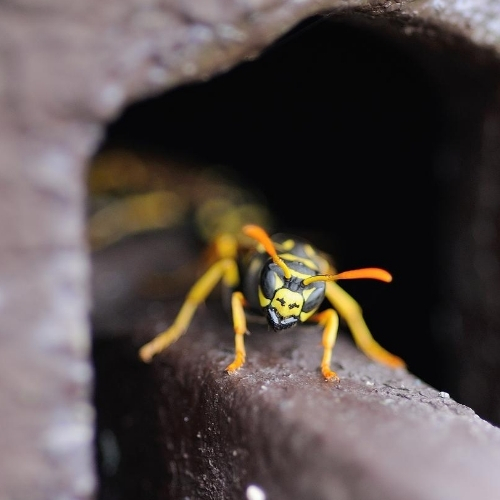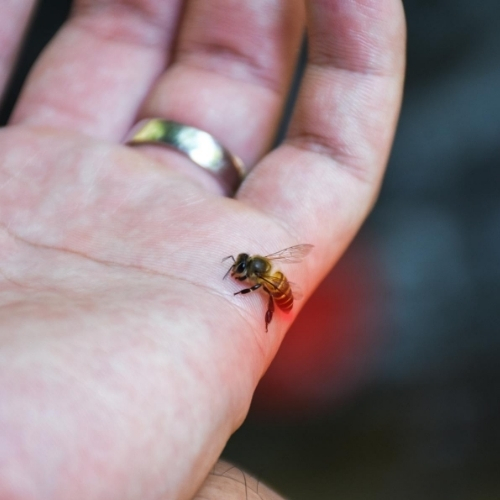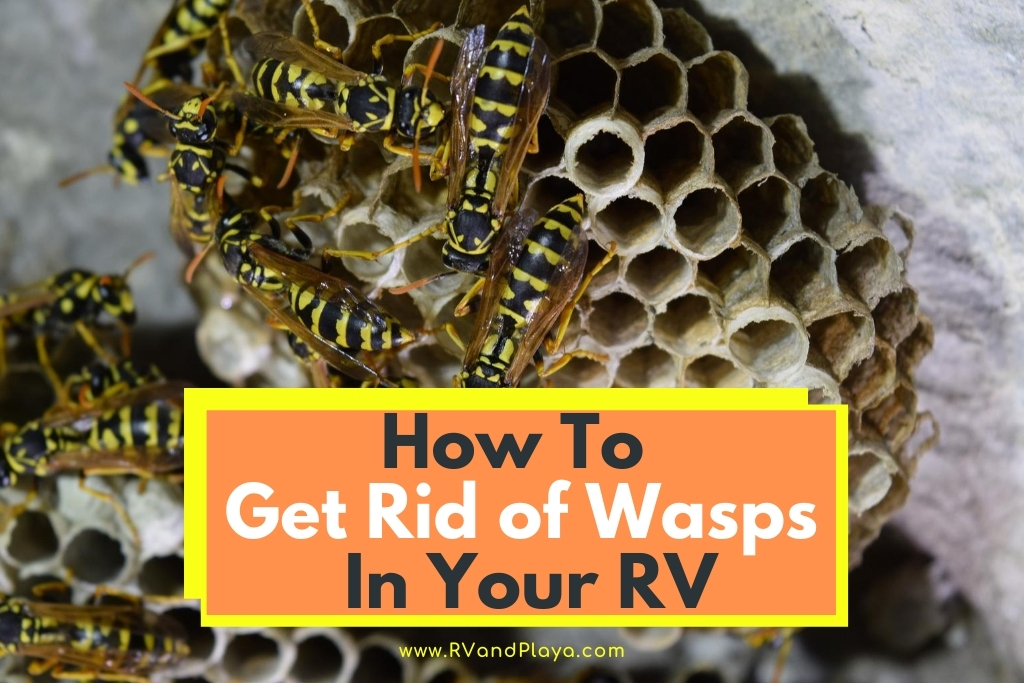Many people enjoy taking their recreational vehicles on long trips across the country, but unwanted pests can make this experience far less enjoyable. If an RV owner isn’t vigilant, bees and wasps may build their nests inside of their RV, adding a potentially dangerous element to their travel experience. Getting rid of bees and wasps can be troublesome, but with enough patience, it is possible to run them off and keep them out for good.
How to get rid of wasps in your RV? The best way to keep wasps from building their nest inside of your RV is by preventing them from getting into your RV in the first place. Keeping things that bees and wasps are attracted to away from your RV is a great precaution.
If these pests have already built their nest inside of your RV, don’t worry. There are repellants on the market that can be used to run them off too. After repelling the wasps, destroy their nests to make it harder for any remaining wasps to survive in your RV.
If you are struggling to keep wasps out of your RV, don’t worry! You’re not alone. There are many methods that travelers like you have developed, which you can use to prevent wasps from making your RV their home. These are some things you can do to get rid of wasps in your RV.
Table of Contents
Why Are Wasps In Your RV?
Wasps are attracted to your RV because it is a warm, safe place for them to build their nests. Most RVs aren’t in use during the winter, and there are many well-insulated places for queen wasps to hole up and hibernate.
Over the course of the winter, the queen wasps begin birthing new wasps that help build their nest and gather food. Once the warmer months of the year come around, the nest is completed, and the colony grows out of control. Unfortunately, this is also when you are most likely to be using your RV.

In the fall season, male wasps die off after impregnating the queen wasps. With no male wasps to keep them safe, the queen will likely seek safe haven in the tighter areas of your RV.
Wasps typically look for safe refuge in insulated walls, crevices, and other small cavities that are not easily accessible to predators. Once they’ve found a safe place, they will begin to build new colonies.
During the warmer months, wasps are still likely to seek refuge in your RV, even if you are already using it. People normally keep food in their RVs and wasps enjoy human food just as much as we do.
Wasps are attracted to protein-based foods and sweet foods, which are commonly found in a human diet. If you leave food around your RV, you are making it easy for the wasps to eat to their heart’s content.
Flowers may also attract wasps because flowers contain sweet nectar that wasps love to eat. The fragrance of flowers is also known to attract wasps, making the risk of attracting wasps twice as significant.
Related reading: 15 Effective Ways to Stop Condensation in Travel Trailers or RV
Inspecting Your RV For Wasps
Sometimes you may notice that wasps are flying around your RV, but you can’t figure out where they are coming from. This is especially common in larger RVs because they contain more hidden crevices where wasps can build their colonies. These are some examples of places where you may find wasps living in your RV:
The Vents
RVs typically have a lot of vents that are used to keep the vehicle properly ventilated. These vents may seem difficult for wasps to access, but they are one of the most common places you may find a wasp colony.
The Cabinets
Cabinets are the perfect spot for wasps to build their nests. This is especially true because food is often kept inside of cabinets. If you plan on leaving your RV unattended for an extended period, remove any food from the cabinet space to prevent attracting wasps.
The Refrigerator
Refrigerator units have many nooks that wasps can build nests in. This includes the ventilation system, the space behind the unit, or even the spaces underneath it!
The Stove
If your stove hasn’t been used in months, it is a good idea to check the different surfaces of it for wasps. Food buildup may be left on your stove too, which can attract wasps, so clean all surfaces if you plan on leaving your RV unattended.
Dealing With Wasp Nests In Your RV
If you discover a wasp nest in your RV, you need to remove them immediately. If you don’t want to remove the nests yourself, you can hire a professional to do it for you. For those who prefer a do-it-yourself approach, here are some tips for removing wasps nests from your RV.
How to get rid of wasp’s while camping >> Check out the video below:
Prevention
The best first step toward keeping wasps out of your RV is preventing them from showing up in the first place. Cover the vents in your RV using materials like wire mesh.
This will prevent wasps from entering the ventilation system, where they will be incredibly difficult to flush out. Take a similar approach to preventing wasps from finding refuge behind, underneath, and on top of your other RV appliances.
Limit the amount of open space around large appliances that are hard to clean, and if this is not possible, use wire mesh to keep wasps away.
When wire mesh isn’t an option, consider placing wasp repellent plants like spearmint, eucalyptus, or wormwood.
Wasp Traps
Combining sugar and water in an open water bottle is a highly effective way to trap and kill wasps. The sugar tempts the wasp into entering the container, then the water and shape of the bottle prevents them from escaping.
Spray Wasp Repellent
There are many chemical-based wasp repellents and pesticides available on the market. Simply purchase one and spray it onto a wasp nest, while making sure you are adequately covered to avoid stings.
Pest control bombs achieve a similar effect and can be used to deal with larger wasp infestations. If chemical solutions are not available, try using a mixture of soap and water to kill off the residents of small wasp nests. Insect experts believe that soap clogs the breathing apparatus of wasps, killing them instantly upon contact.
What To Do If A Wasp Stings You
Sometimes you may discover a wasp nest after you have already been stung. Oftentimes wasp stings are nothing to be worried about, but if you are allergic, you may need to seek medical attention immediately.
If you are not allergic and have a mild reaction to the sting, there are steps you can take to minimize the health consequences. First, wash the affected area using soap and water. Then, apply ice to the area. It may also be appropriate to take an anti-inflammatory medication, such as ibuprofen, to limit swelling in the area.
Wasp stings are likely to get itchy as well, in which case you may want to apply some calamine lotion for relief.

Keep Wasps Out Of Your RV
Keeping wasps out of your RV is easy when you know what steps to take. Before taking your trip, check your RV thoroughly for wasps nests. Remember, hidden crevices and small places are where you should look first.
If you find any wasps flying around, follow them to find out where their nest is located. Once you find them, use the steps outlined in this article to get rid of them.
Safe travels!
Sources:
https://cchealth.org/column/2014-0425-healthy-outlook.php
https://pestlockdown.com/5-things-that-attract-wasps/
Recommended reading
For more helpful articles about RVing please check out our articles below:
Do RV Rentals Allow Pets? (Pet Friendly Companies)
9 Easy Tips to Keep Your Dog Warm While Camping
Dogs in Travel Trailers: Here is What You Need to Know
Is Progressive RV Insurance Good? What You Must Know
Recent Posts
Is Toyota Remote Connect Free? (Subscription, Services Plans)
Does Toyota Remote Connect have an included trial? It used to be the case that, when you bought a new car, you made one straightforward payment and that was it. Now, it feels like there are...
Toyota Safety Connect: What It Is And Why You Need It? Whether you’re buying a new Toyota or you’ve had one for a while you will have been given the hard sell on their Connected Services but do...

